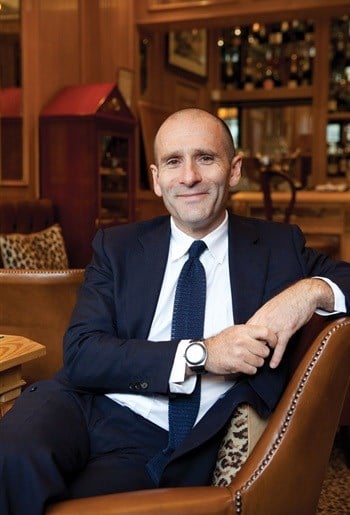#BizTrends2018: 2018 travel forecast - seven trends to anticipate

1. Off-season travel
Travel has become a way of life. Exploring, adventuring, relaxing, escaping, reconnecting – all of these have become a part of what we do, and shape who we are. The numbers of travellers are growing annually, dramatically. Clearly, however, in key cities, the industry can’t build accommodation fast enough to accommodate high season peaks, and travelling on your own can result in long queues that simply exhaust the desire to fulfil a travel dream.
Readjusting our mindsets to embrace year-round travel as a genuine prospect allows travellers to fully enjoy every moment and not have that sinking feeling of worrying about battling crowds at each turn. Lack of crowds means lack of frustration of time and space lost as you embark on the same “bright idea” to travel to the same place at the same time as everyone else.
The following three variables are being increasingly considered and I believe we will see more travellers shifting to embrace year-round travel:
• If you’ve ever been to the same destination during the typical peak season and the off-season, you could relate to me instantly. The way locals treat visitors when there aren’t many of them is also worth noticing. Welcomes are warmer and sincerer – you will feel more like a traveller than a tourist.
• You will also see more. Without traffic and queues, one acquires more time and the opportunity to discover a whole new range of activities to enjoy and take part in during the less-traditional peak periods.
• Finally, there are the prices. From air to activities to transport, depending on the time of year and season, rates can vary significantly. Discounts are for times of low demand. The plus points make it all a rather obvious alternative.
2. True sustainability will become a requisite, not a nice to have
"Over-tourism” is a growing concern. During the peak European summer travel months, destinations such as Venice, Barcelona and Dubrovnik find themselves simply overwhelmed, local residents growingly angered by the takeover of tourists. The insurgence of what I have termed the “ice cream tourist”. We have all just read about the changes coming for cruises in Venice, which will serve only to increase the concerns.
For travel to remain true to people and place, we must ensure that we work to grow tourism in a sustainable manner – assisting local communities to celebrate who they are, respecting their uniqueness, as a prelude to building their economy and protecting their environment. Through JoinTrafalgar, as well as our TTC-aligned Treadright Foundation, we must all play our part in ensuring that tourism remains a force for good.
The term “sustainable” has been increasingly paired up with “travel” and “tourism” to denote a desired way of operating. We are hearing more and more from our travellers that they are becoming increasingly engaged with spending their money on “sustainable” ventures. It is not about being eco-friendly, it is about being environmentally-conscious – being part of the bigger picture, preserving something for the long term.
But how do we really give meaning to the term “sustainability? These are my three criteria for sustainable travel in 2018 and beyond:
1. Economic – the business model that supports an enduring tourism economy
2. Cultural – being sensitive to the history, traditions, identity and ideologies of a people and place
3. Environmental – preserving, protecting and promoting the gifts of natural environment all around us
As previously referenced, differentiated seasonality will diminish – no more FOMO for those that don’t travel in summer in Europe, for example. We will see people travelling at traditional “off-peak” or shoulder periods as is, not only to avoid excessive crowds but also to avoid compromising some of those destinations that cannot cope with the burgeoning influx. It will help pace the tourism intake and also sustain businesses that might otherwise be stretched with having the highest percentage of their business boom during the key summer months.
3. Technology, enriching the travel experience
From AR and VR and IoT (Internet of Things) they are all becoming integrated into daily life. In 2018, I envision them further assimilating into the traveller experience, making them an integral part of the journey to the ultimate destination. It shouldn't be surprising that holidaymakers in 2018 will want to ensure that technology works for them to leverage their travels – before they go, whilst travelling, and after, especially when sharing reviews. As an industry, we need to ensure we are tapping into this trend, embracing technology that genuinely enriches our experiences.
There is no doubt that the written form is quickly evaporating and today consumers are ever-increasingly looking at video for inspiration - and particularly short-form video (from 5 – 30 seconds). I know that when a video starts, I look at the time bar and if its long, I click off. In 2018, we will see short-form video help drive original content as well as engage and inspire travellers.
Finally, if I recall correctly, last year, we reached the tipping point when we viewed more websites on our smartphones and tablets than our desktops. This milestone highlights how our interaction with technology is rapidly shifting. With this distinct trend and seeing how our guests use technology whilst travelling with us in 2018, Trafalgar will be introducing an innovative new way for our guests to get information via mobile pre, during and post their travels, as well as enabling them to engage with fellow travellers and share their experiences across their social channels.
Today’s travellers are more ambitious and adventurous, both in their travelling and in their travel-sharing. It’s no longer about checking boxes.
4. It’s all about personalisation
Lest we forget: when travelling, personalisation is no longer a pleasant surprise for customers, it is an absolute expectation. There is no reason at all why the power of touching one should be lost to the masses. Today’s connectivity means that consumers are rightfully expecting, and demanding, more. From our perspective, for every single one of our Trafalgar guests around the world, no one matters more than each of them. Their needs and expectations, are simple: recognise, understand and respect me for the individual that I am.
Why? Because consumers want to feel like their interests and preferences are not only taken seriously but also applied. They want their holiday to be as individual as they are. And rightly so. And because they have invested time to research and finally choose their holiday with us over others, it is expected that we reciprocate by honouring not just their choice, but honouring them. Their happiness is our unequivocal goal.
5. HDD - Holiday Deficit Disorder
An expression given to me by my wife. It wasn’t that long ago that taking all of one’s holiday time was almost frowned upon. Today the importance of unplugging is greatly understood. Never before has there been such awareness of the strong relationship between wellness and taking time off.
Today, “holiday shaming” is rapidly becoming an ideal of the past. Encouraging personal time off is the evolved way of looking at employee wellbeing, on and off the job. At the same time, travellers recognise that regularly recharging, refreshing and rejuvenating is part of a healthy work-life balance. What better way than to travel to new places, get away from the day-to-day and completely escape. The need to learn more to increase one’s productivity, creativity, sense of purpose and sense of participation is not only acquired in the workplace. There is no better school for personal growth and decompression than the travel world that surrounds us all.
6. Off the beaten track destinations
Discovering the mysterious and the new remains vital to travellers. I continue to see more and more people visiting cities that were, until recently, overlooked, unheard of or inaccessible.
There is no doubt that the proliferation of low-cost airlines is having a profound, positive impact on these lesser known places. Regional low-cost carriers continue to proliferate globally, making discovery of somewhat unexplored destinations a delightful reality. In so doing, these new air routes unlock previously unseen economic, social and cultural uplift. Over the past decade, airlines have added over 10,000 new routes — serving more than 37,000 city pairs. There are now 1,280 international airports serving 48,977 routes worldwide.
What does this mean for travellers in 2018? More choices, more exploration, more learning, more opportunity to create more in life for the people accessing these remarkable new jewels of travel.
7. Bragging rights
If there is one thing that is going to distinctly differentiate this travel generation compared to those of years and generations past, it is the articulation of feedback – posting, rating, bragging. Today’s travellers are more ambitious and adventurous, both in their travelling and in their travel-sharing. It’s no longer about checking boxes. Travellers want adventurous, participatory experiences. Sight-seeing is important but not enough.
Sight-doing is the way to touch their travel souls and make memories to last a lifetime. The quest for realness - living local – has put heightened pressure on the most overused word in travel, “authentic”. What must never be forgotten is what travellers are ultimately looking for: getting below the surface of destinations, understanding their uniqueness and very essence. In 2018, I think there will be an increased swathe of people fully engaged in the sharing economy, communicating to the world the wonderfully enriching experiences that they have discovered but that their friends haven’t. Yet.
So, these are my top seven travel insights for 2018 – my truths for the year ahead. May they serve you and your aspirations well as the new year unfolds.





















